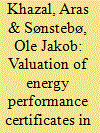| Srl | Item |
| 1 |
ID:
190411


|
|
|
|
|
| Summary/Abstract |
What are the various ways in which local governments in China accommodate migrants through housing policies, and what are the forces that drive these variations? Through systematic coding of policy documents from 97 prefecture-level cities, this study captures the patterns of migrant housing policies using cluster analysis. We found that 18.6 per cent of the cities adopted a residual approach. Most cities adopted a rental-based approach (public and private rental, and collective rental) that could only meet migrants’ short-term housing needs. Only a few cities (12.4 per cent) adopted a citizenship-oriented approach, which best fits the central government's overarching goal of facilitating migrant workers’ long-term settlement in the host cities. Regression analyses examining the determinants of local migrant housing policies showed that the policy variations were not only shaped by economic and political concerns but also the salience of urban issues (problem-solving functions) and previous welfare generosity (path-dependency tendencies).
|
|
|
|
|
|
|
|
|
|
|
|
|
|
|
|
| 2 |
ID:
154450


|
|
|
|
|
| Summary/Abstract |
This paper explores the dynamic nature of the transformation of public housing regimes in urban China since the abolishment of the urban welfare housing system in the late 1990s. We summarize the latest progress in the development of public housing in post-reform China and investigate the driving forces behind these developments. A close examination of the public rental housing program in Shanghai helps to show that the recent revival of public housing in Chinese cities is mostly driven by the desire for economic growth. We conclude that the state provision of housing could be a short-run state remedy to alleviate economic imbalance and social inequality. However, in the long run China needs to seek more effective solutions to solve the low-income population's housing affordability problems.
|
|
|
|
|
|
|
|
|
|
|
|
|
|
|
|
| 3 |
ID:
099439


|
|
|
| 4 |
ID:
116487


|
|
|
|
|
| Publication |
2012.
|
| Summary/Abstract |
This paper argues that the low-income housing programme in China has so far failed to provide adequate housing for the poor for three main reasons: the central government's failure to define a clear mission; a lack of commitment from local governments; and an exclusionary policy towards migrants. A systematic review of low-income housing policy in China shows that the central government juggles its economic and socio-political goals thereby causing constant changes in low-income housing policy. Meanwhile, the existing public finance system, the performance evaluation system and localization in policy implementation have all resulted in a lack of commitment from local governments to low-income housing. Inadequate provision is made worse by problems with allocation. Despite encouraging changes since 2010, many factors underlying the government's failures remain unchanged, thus the fate of low-income housing remains uncertain.
|
|
|
|
|
|
|
|
|
|
|
|
|
|
|
|
| 5 |
ID:
131513


|
|
|
|
|
| Publication |
2014.
|
| Summary/Abstract |
Kuwait today is 99 percent urbanized. Though hosting a substantial desert population in the past, Kuwait no longer contains any Bedouin who practice a nomadic or pastoral lifestyle. And yet the term bad? remains in popular use in Kuwait to designate a group considered sociologically and culturally distinct from the ?a?ar, or settled urbanites, which in Kuwait's context refers solely to descendants of the pre-oil townspeople. This article explores why these social designations still exist in Kuwait and analyzes the origins of the conflictual relationship between the two groups. I argue that the persistence of the ?a?ar/bad? dichotomy is an outcome of state-building strategies adopted in the early oil years, mainly linked to citizenship and housing policies, that contributed to fixing ?a?ar and bad? as not only socially distinct but also geographically bounded groups. These state policies implemented between the 1950s and 1980s fostered the political integration but social exclusion of the bad?. The article examines the lived realities of these incoherent policies as one way of explaining how the bad? shifted from being the rulers' main loyalty base in the early oil decades to becoming their primary opposition today.
|
|
|
|
|
|
|
|
|
|
|
|
|
|
|
|
| 6 |
ID:
094601


|
|
|
|
|
| Publication |
Oxon, Routledge, 2010.
|
| Description |
xiv, 202p.
|
| Standard Number |
9780415434850
|
|
|
|
|
|
|
|
|
|
|
|
Copies: C:1/I:0,R:0,Q:0
Circulation
| Accession# | Call# | Current Location | Status | Policy | Location |
| 054853 | 362.5561095/MID 054853 | Main | On Shelf | General | |
|
|
|
|
| 7 |
ID:
177105


|
|
|
|
|
| Summary/Abstract |
The implementation of Energy Performance Certificates (EPCs) is expected to reduce energy consumption and carbon emissions by providing actors with information that can be used to make better-informed decisions. This paper is the first to investigate EPCs in the Norwegian residential rental market. Applying the hedonic multilevel approach using information from some 440,000 rental contracts over the period of 2011–2018, we find that labeled dwellings have a premium compared with non-labeled dwellings, and that the premium is increasing with a higher EPC-label. We further define two classes of lessors – professional (real estate agents) and nonprofessionals (homeowners) – to study potential heterogeneity in EPC valuation and find that professionals assign higher rents compared with nonprofessionals. Dwellings with high energy efficiency are associated with a higher premium if rented out by a professional, a significant part of which stemming from higher EPC valuation. The results are robust to a number of heterogeneity analyses and after controlling for sample selection bias and unobserved locational heterogeneity. The findings of this paper signify the necessity to increase awareness and public dissemination regarding the EPC policy.
|
|
|
|
|
|
|
|
|
|
|
|
|
|
|
|